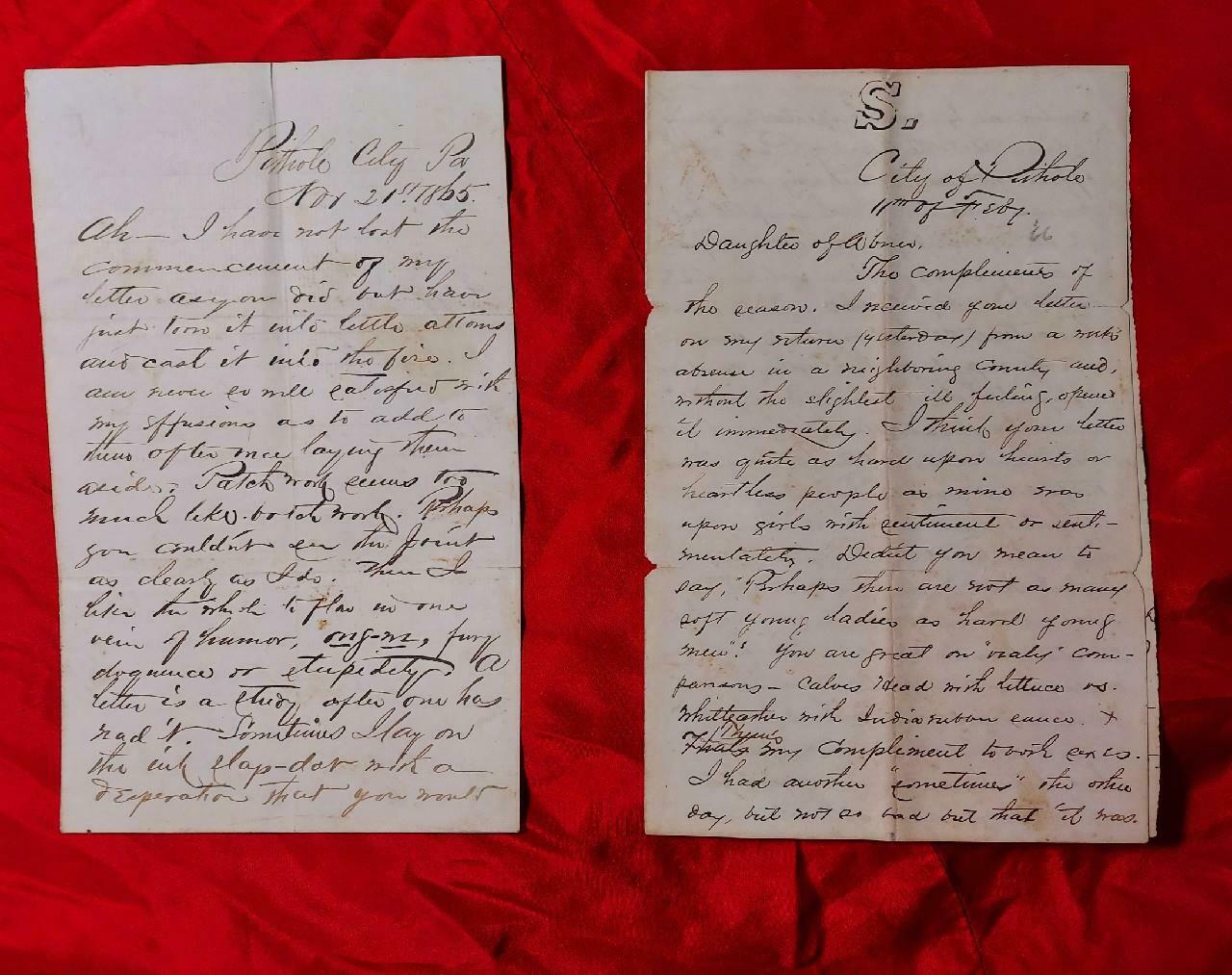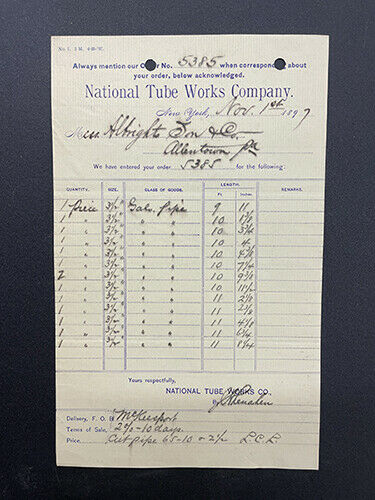-40%
1865-66 ARCHIVE Civil War Artist William Henry Shelton in Pithole City PA
$ 2640
- Description
- Size Guide
Description
[POST CIVIL WAR]. Archive of William Henry Shelton (Allen's Hill, NY., 1840 - Morristown, NY., 1932) A respected nineteenth century painter, etcher and illustrator, William Henry Shelton is today best remembered for his military art, most specifically his scenes from the American Civil War. W. H. Shelton, in fact, served in a New York State regiment during the conflict and thus his etchings and drawings are based upon actual experiences. He participated as an artillery commander in the Battle of the Wilderness, where he was badly wounded and taken prisoner by the Confederates. Approximately 8 fascinating unpublished multi-paged letters primarily to his cousin Louisa relating to his one year experiment & experience in the newly founded oil boom town of Pithole in Venango County, Pa. between 1865 through 1866. (List of Letters included in this archive): Dated: Pithole Pa. November 21st 1865 four pages Dated: City of Pithole 11th of February 1866 five pages with illustration of primitive oil rig. Dated: Pithole City, Pa. January 21st 1866 four pages Dated: Pithole City, Pa. December 31st 1865 six pages Dated: Pithole City, Pa. December 3rd 1865 eight pages Dated: Pithole City, Pa. October 15th 1865 seven pages Dated: Pithole City,Pa. February 19th 1866 four pages Dated: Pithole City, Pa. November 3rd 1866 six pages (Here are some excerpts from these letters) *No doubt you must hear about Pithole a wonderful place…but I will save my comments by sending you a local newspaper. *None of the churches are yet completed The Methodist and Presbyterian are going up side by side. And the Catholic Church is in another part of the city which will be built this fall. *The Methodist has services in the morning and the Episcopalians in the afternoon at the Academy of Music. *The Opera house which is just opposite our window seems beneath the attention of denominations needs church services above all the rest. *We all nearly live in Hotels in Pithole which there are 30 or less. Some of our hotels have very aristocratic titles such as: The Astor, Metropolitan, United States, Two Nationals, St. Cloud, St. James, St. Nicholas, Continental, Scott, Lincoln & Sherman. Others name their hotels to where they hail from such as The Rochester, Buffalo, New York, Michigan, Oil City, and Syracuse etc… ( I have photographed detailed sections of the letter referring to the hotels) *I have left the United States the oldest house in the city in which I have been boarding for two months and now have taken rooms at the Montaro this morning. *Perhaps you meant to say there are not as many soft young ladies as hard young men.” *One of the letters dated the 6th of February of 1866 describes a night of entertainment for the nation of Pithole….quite fascinating in great detail. *I am going to cling to your letters and curb my Pithole acquaintances. I am clinging to the letter now quite oblivious to the six companions in the room. Four are playing a Whish (In a jug band, the washboard can also be stroked with a single whisk broom) One a guitar and the other a young M.D. is pacing the room threatening to lick a brother their profession? *We old soldiers by thou may are the most charitable class in the world. Captain Brady an ex-nb or nc officer…late on Magruder’s staff was minced (hit) by a Mechanicsville shell in an animated conversation about the war. Pithole City is known in the Pennsylvania oil region as the oil boomtown that vanished as quickly as it appeared. News of the successful Frazier Well along Pithole Creek was widely published in the nation’s newspapers in January 1865. Boarding houses, hotels and businesses of all kinds went up overnight. More big wells were struck during the summer of ’65, and people came from all directions in hope of making a better life after five years of bitter war and strife in the United States. Oil drillers and speculators, gamblers and business owners, women and men looking for work made up the 15,000 people living in the area by that fall. Oil wells filled the Pithole Creek Valley producing more than 5,000 barrels of oil a day for a while. Thousands of teamsters hauled the barrels of oil to the nearest railroad depot at Miller Farm in the Oil Creek Valley. The city boasted a foundry and machine shop, the third busiest post office in Pennsylvania and every type of business and entertainment house imaginable. Banks handled tens of thousands of dollars in transactions daily. But, fortune was fleeting. Oil prices fell from .00 a barrel to .50. Samuel Van Syckle’s pipeline opened in the fall of 1866 putting thousands of teamsters out of work. Seventeen disastrous fires burned wells, businesses and boarding houses causing an unknown number of injuries and death. People fled to new oil fields and boomtowns leaving less than two thousand people in the once thriving city by December 1866. In the fall of 1870, only 43 households and one hotel remained. The Pithole City Charter was revoked in February 1877 and the land sold to a farmer at sheriff’s sale.1865-66 ARCHIVE Civil War Artist William Henry Shelton in Pithole City PA
1865-66 ARCHIVE Civil War Artist William Henry Shelton in Pithole City PA
Click images to enlarge
Description
[POST CIVIL WAR]. Archive of
William Henry Shelton
(Allen's Hill, NY., 1840 - Morristown, NY., 1932)
A respected nineteenth century painter, etcher and illustrator, William Henry Shelton is today best remembered for his military art, most specifically his scenes from the American Civil War. W. H. Shelton, in fact, served in a New York State regiment during the conflict and thus his etchings and drawings are based upon actual experiences. He participated as an artillery commander in the Battle of the Wilderness, where he was badly wounded and taken prisoner by the Confederates.
Approximately 8 fascinating unpublished multi-paged letters primarily to his cousin Louise A.Wakelee relating to his one year experiment & experience in the newly founded oil boom town of Pithole in
Venango County,
Pa. between 1865 through 1866.
(List of Letters included in this archive):
Dated: Pithole Pa. November 21
st
1865 four pages
Dated: City of Pithole 11
th
of February 1866 five pages with illustration of primitive oil rig.
Dated: Pithole City, Pa. January 21
st
1866 four pages
Dated: Pithole City, Pa. December 31
st
1865 six pages
Dated: Pithole City, Pa. December 3
rd
1865 eight pages
Dated: Pithole City, Pa. October 15
th
1865 seven pages
Dated: Pithole City,Pa. February 19
th
1866 four pages
Dated: Pithole City, Pa. November 3
rd
1866 six pages
(Here are some excerpts from these letters)
*No doubt you must hear about Pithole a wonderful place…but I will save my comments by sending you a local newspaper.
*None of the churches are yet completed The Methodist and Presbyterian
are going up side by side. And the Catholic Church is in another part of the city which will be built this fall.
*The Methodist has services in the morning and the
Episcopalians in the afternoon at the Academy of Music.
*The Opera house which is just opposite our window seems beneath the attention of denominations needs church services above all the rest.
*We all nearly live in Hotels in Pithole which there are 30 or less. Some of our hotels have very aristocratic titles such as: The Astor, Metropolitan, United States, Two Nationals, St. Cloud, St. James, St. Nicholas, Continental, Scott, Lincoln & Sherman. Others name their hotels to where they hail from such as The Rochester, Buffalo, New York, Michigan, Oil City, and Syracuse etc…
( I have photographed detailed sections of the letter referring to the hotels)
*I have left the United States the oldest house in the city in which I have been boarding for two months and now have taken rooms at the Montaro this morning.
*Perhaps you meant to say there are not as many soft young ladies as hard young men.”
*One of the letters dated the 6
th
of February of 1866 describes a night of entertainment for the nation of Pithole….quite fascinating in great detail.
*I am going to cling to your letters and curb my Pithole acquaintances. I am clinging to the letter now quite oblivious to the six companions in the room. Four are playing a Whish (
In a jug band, the washboard can also be stroked with a single whisk broom) One a guitar and the other a young M.D. is pacing the room threatening to lick a brother their profession?
*We old soldiers by thou may are the most charitable class in the world. Captain Brady an ex-nb or nc officer…late on Magruder’s staff was minced (hit) by a
Mechanicsville shell in an animated conversation about the war.
Pithole City is known in the Pennsylvania oil region as the oil boomtown that vanished as quickly as it appeared. News of the successful Frazier Well along Pithole Creek was widely published in the nation’s newspapers in January 1865. Boarding houses, hotels and businesses of all kinds went up overnight. More big wells were struck during the summer of ’65, and people came from all directions in hope of making a better life after five years of bitter war and strife in the United States. Oil drillers and speculators, gamblers and business owners, women and men looking for work made up the 15,000 people living in the area by that fall.
Oil wells filled the Pithole Creek Valley producing more than 5,000 barrels of oil a day for a while. Thousands of teamsters hauled the barrels of oil to the nearest railroad depot at Miller Farm in the Oil Creek Valley. The city boasted a foundry and machine shop, the third busiest post office in Pennsylvania and every type of business and entertainment house imaginable. Banks handled tens of thousands of dollars in transactions daily.
But, fortune was fleeting. Oil prices fell from .00 a barrel to .50. Samuel Van Syckle’s pipeline opened in the fall of 1866 putting thousands of teamsters out of work. Seventeen disastrous fires burned wells, businesses and boarding houses causing an unknown number of injuries and death. People fled to new oil fields and boomtowns leaving less than two thousand people in the once thriving city by December 1866. In the fall of 1870, only 43 households and one hotel remained. The Pithole City Charter was revoked in February 1877 and the land sold to a farmer at sheriff’s sale.
In conclusion these newly discovered letters offer an incredible glimpse into a legendary ghost town from a legendary Civil War soldier and artist.
Fresh to the market.
ref; blue archival k container
Images sell!
Get Supersized Images & Free Image Hosting
Create your brand with Auctiva's
Customizable Templates.
Attention Sellers - Get Templates
Image Hosting, Scheduling at Auctiva.com.
Track Page Views With
Auctiva's FREE Counter




















